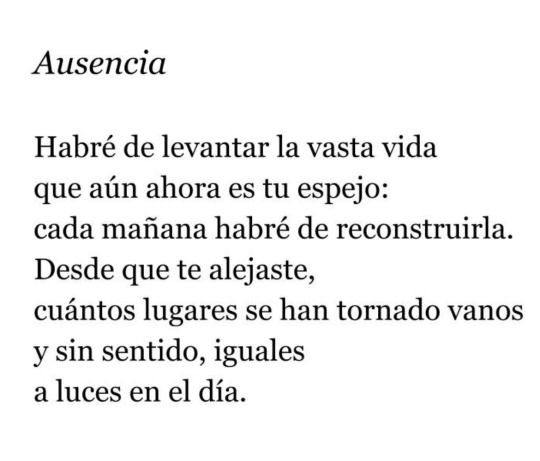#jose luis borges
Explore tagged Tumblr posts
Text
insan mütevazılığı konusunda da kendini beğenmiş olabilir.
max frisch - günlükler
#max frisch#günlükler#roland barthes#yasak olmayan hazlar#yas günlüğü#william shakespeare#ahmet hamdi tanpınar#hamlet#haruki murakami#murathan mungan#jose luis borges#jean baudrillard#jacques lacan#blogger#edebiyat#kitap#felsefe#kitaplar#blog#sokrates'in savunması#sokrates#platon#sofist#marcus aurelius#karl marks#kendime düşünceler#epikuros#epiktetos#herakleitos#kitap kurdu
59 notes
·
View notes
Text
“Noches hubo en que me creí tan seguro de poder olvidarla que voluntariamente la recordaba. Lo cierto es que abusé de esos ratos; darles principio resultaba más fácil que darles fin".
10 notes
·
View notes
Text
El periodista argentino Antonio Carrizo en su programa "La vida y el canto" preguntó a Jorge Luis Borges:
─ Señor ¿Qué opina de la tauromaquia? ¿Cuál es su concepto sobre la figura del torero?
Borges contestó:
─ «La tauromaquia es una de las formas vigentes de la barbarie. En cuanto a la figura del torero, creo que es esencialmente un cobarde. Un hombre que con todo un aparato racional de estrategias, entrenamientos, armas, estocadas practicadas, clases y mucho estudio premeditado, se mide frente un animal pasmado por la sorpresa, por la ansiedad; un animal que no tiene otro recurso que los reflejos de su instinto primario.
Bajo esa disparidad podemos medir el valor de los toreros. La valentía verdadera no soporta desniveles tan abusivos. Por eso para mí los toreros no son valientes, sino más bien bufones; los bufones de la valentía».
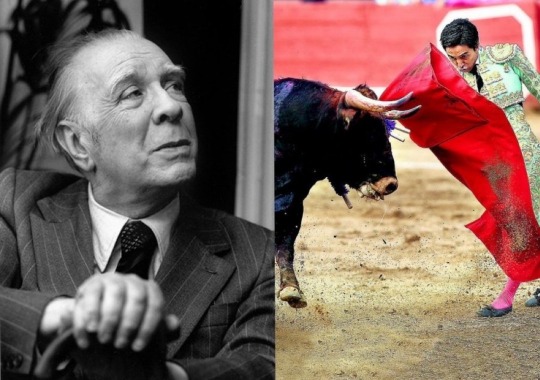
2 notes
·
View notes
Text
The person who wrote the Wikilow "How to Kiss Someone For the First Time" article is an unsung hero of romance for our 13 year olds today, even if he is a cruel man, his soul will be saved in a Borgesian "Moneylender who incidentally inspired Shakespeare's Shylock character" way.
1 note
·
View note
Text
Buenos Aires, 1923
Buenos Aires/Borges, 1923 Buenos Aires por primera vez
Borges Cien | Jornadas UN SIGLO DE LITERATURA SUPERPODEROSA
Del 1º al 15 de Julio Celebramos 100 años de la edición del primer libro de Jorge Luis Borges, Fervor de Buenos Aires. El programa de actividades combina clases magistrales con transmisión por streaming, recorridos literarios guiados, revista mural, cine y un mapa de la Buenos Aires de Borges.
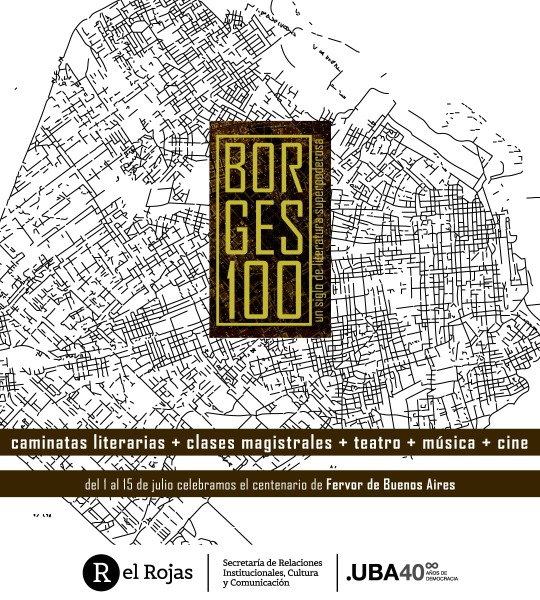
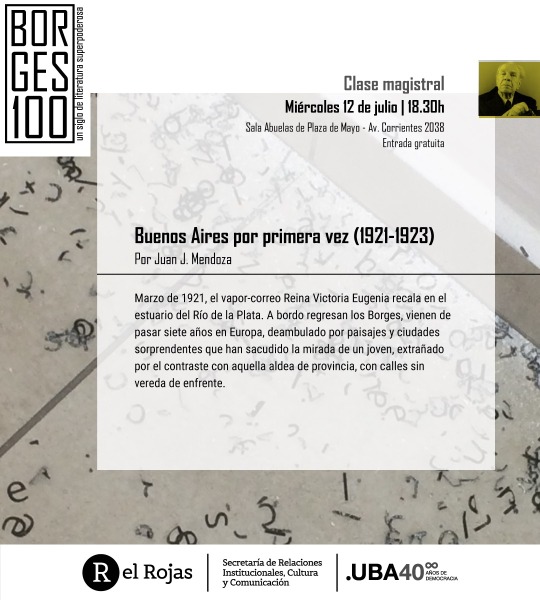
+ Info Aquí
1 note
·
View note
Text
Pixel Art (Proceso)
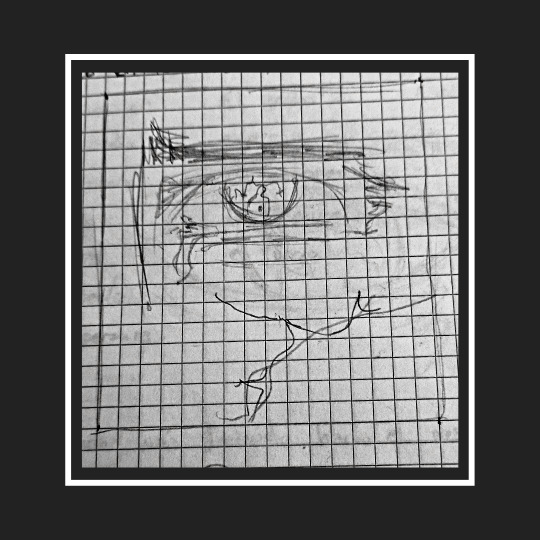
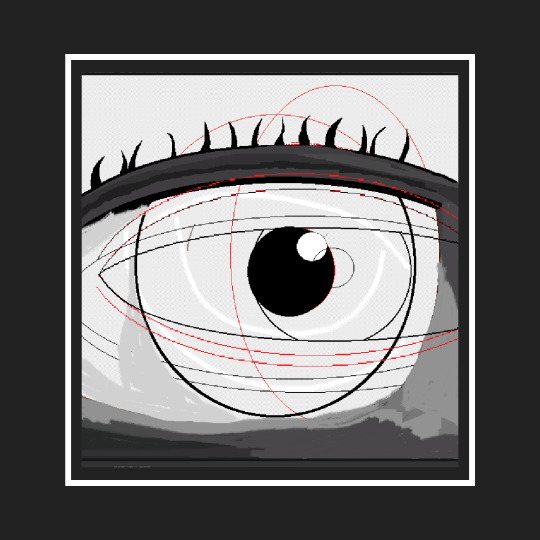
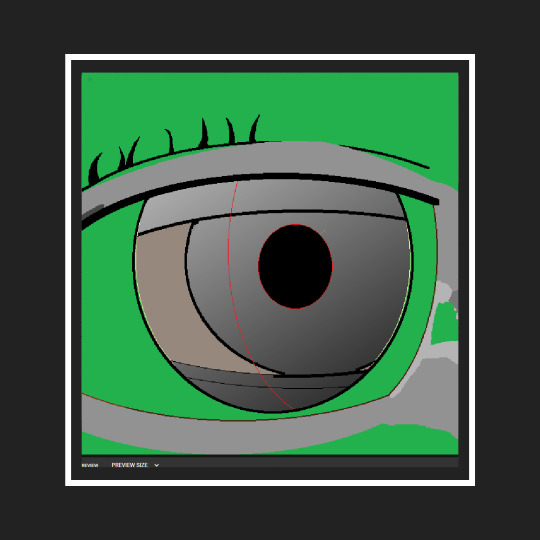
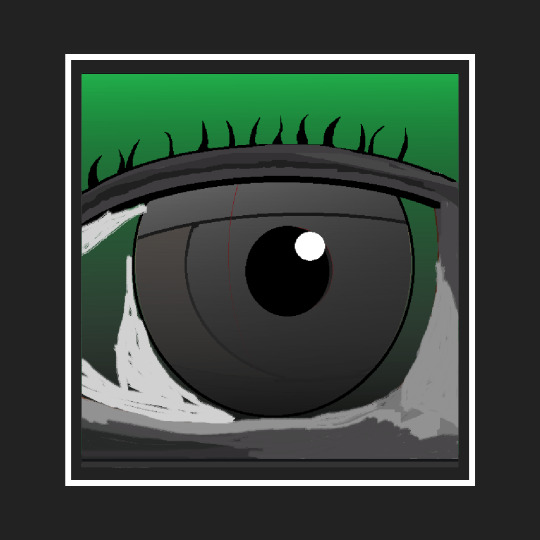
Proceso de la creación del Pixel Art sobre la obra Ruinas Circulares de Luis Borges.
Basado en los conceptos del deseo, la ambición y la frustración del "hombre gris" y poniendo en tela de juicio a la misma realidad.
Conceptos:
Deseo: es recurrente en el personaje con la búsqueda de un sueño.
Ambición: es el deseo intensificado, esta vez en la creación de otro ser.
Frustración: la constante durante todo el proceso del mundo onírico y la idealización de su creación por su ambición.
Idea Gráfica:
La idea es representar al deseo como una mirada enfocada en una sola cosa, la ambición del personaje reflejada en la mirada, en el deseo, para al final retratar la frustración en el gesto que rodea al deseo, a la mirada atrapada entre arrugas y una mirada agotada, molesta por la incomprensión. (Trabajo incompleto aún)
Materialidad:
El principal recurso de todo este trabajo es el digital, por la misma razón de representar conceptos en un mundo que al final del día resulta ser irreal.
¿Pero es cierto que es irreal? Es decir, la misma realidad es cuestionable. Si un árbol cae en el bosque y nadie lo escucha ¿realmente cayó? relacionando al mundo digital con el onírico, si no se puede tocar o sentir ¿realmente existe?
De acuerdo con el filósofo y escritor Pierre Levy "Lo virtual es una extensión de lo real"
¿No podríamos aplicar el mismo concepto a los placeres oníricos?
0 notes
Text
“Menard (acaso sin quererlo) ha enriquecido mediante una técnica nueva el arte detenido y rudimentario de la lectura: la técnica del anacronismo deliberado y de las atribuciones erróneas. Esa técnica de aplicación infinita nos insta a recorrer la Odisea como si fuera posterior a la Eneida y el libro Le jardín du Centaure de Madame Henri Bachelier como si fuera de Madame Henri Bachelier. Esa técnica puebla de aventura los libros más calmosos. Atribuir a Louis Ferdinand Céline o a James Joyce la Imitación de Cristo ¿no es una suficiente renovación de esos tenues avisos espirituales?”
— Jorge Luis Borges: “Pierre Menard, autor del Quijote”
1 note
·
View note
Text

Matter Dies, Not The Spirit by José Villegas Cordero, 1916 :: [Guillaume Gris]
* * * *
“Jorge Luis Borges fantasizes about Shakespeare speaking to God: I who have been so many men in vain want to be one, to be myself. God answered him out of a whirlwind: I too am not I; I dreamed the world as you, Shakespeare, dreamed your own work, and among the forms of my own dream are you, who like me are many, yet no one.” — Katia Mitova, from “The Pessoa Syndrome”
[alive on all channels]
#Matter Dies Not The Spirit#Jose Villegas Cordero#Guillaume Gris#about art#alive on all channels#quotes#Katia Mitova#Jorge luis Borges#spirit#speaking to god
2 notes
·
View notes
Text
Jorge Luis Borges – Maio 20, 1928
Agora é invulnerável como os deuses. Nada na terra pode feri-lo, nem o desamor de uma mulher, nem a tísica, nem as ansiedades do verso, nem essa coisa branca, a lua, que já não precisa fixar em palavras. (...)
Agora é invulnerável como os deuses. Nada na terra pode feri-lo, nem o desamor de uma mulher, nem a tísica, nem as ansiedades do verso, nem essa coisa branca, a lua, que já não precisa fixar em palavras. Caminha lentamente sob as tílias; olha as balaustradas e as portas, não para recordá-las. Já sabe quantas noites e quantas manhãs lhe faltam. Sua vontade lhe impôs uma severa disciplina.…
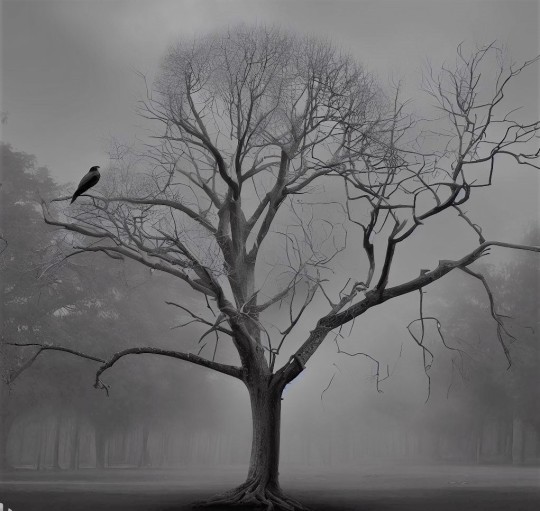
View On WordPress
0 notes
Text

0 notes
Note
Hii, for the life of me I can't find that one anon you answered book recos? (Mobile tumblr search is being a dunce :^) ) Do you have any links? Any recommendations are welcome. Maybe you can add to it? I'd love more things to add to my tba now that I have the time.
oh yes my original post is here!! and i also did a nonfiction version here
also some other recommendations:
stories of your life and others by ted chiang [sci-fi short story collection; includes the short story that inspired the Arrival movie and tbh that wasn't even my favourite of the bunch; one of the best science fiction writers of this generation tbqh. i also recently read "exhalations", another short story collection, and that one has some bangers too]
collected fictions by jorge luis borges [fantasy / magical realism / philosophy; perhaps one of the best writers i've ever read in my entire life. i completely forgot to put borges on the original list. but you simply cannot go your life without reading at least one of his stories]
pure colour by sheila heti [fiction / magical realism; made me literally cry.......from my own personal issues that i saw reflected in the book....holy shit though this book was so good]
death with interruptions by jose saramago [fiction / magical realism; a very cool story in which everyone in a city randomly stops dying and they have to deal with the repercussions of this; i love ideas like this taken to their logical extreme. saramago is such a phenomenal writer, i also read "cain" and holy fuckkkkk]
some other authors i write (only putting them here if i've read multiple books of theirs): Ali Smith, Umberto Eco, Toni Morrison, Joan Didion, Audre Lorde, Neil Gaiman.
26 notes
·
View notes
Text
hiç okumadığı kitaplardı bunlar, hiç okuyamayacağı kitaplar, belki okumayı denediği ama beceremediği kitaplar.
marguerite duras - acı
#marguerite duras#acı#kitap#edebiyat#blogger#felsefe#kitaplar#blog#kitap kurdu#şiir#kitaplık#alberto manguel#jose luis borges#boris pasternak#doktor jivago#charles bukowski#umberto eco#okuma notları#oğuz atay#tutunamayanlar#yaşar kemal#ahmet hamdi tanpınar#huzur#saatleri ayarlama enstitüsü#sel��uk baran#bir solgun adam#uyuyan adam#georges perec#milan kundera#jean paul sartre
30 notes
·
View notes
Text
i have so many semi abandoned books in progress atm somebody please help me budget this my family is dying . or something.
5 notes
·
View notes
Text
Fantasy throughout the world
On top of having an article centered around the French fantasy specifically, the "Modern Success" issue of the BNF Fantasy series also has an article (again written by Anne Besson) covering the topic of "Fantasy throughout the world". Here is, once again, a rough translation by your humble servant:
While heavily dominated by an English-speaking production, fantasy literature found its place in numerous European countries, and managed to cross several continents.
Born in England, grown in parallel on the two sides of the Atlantic oceans, and becoming a mass-phenomenon in the United-States, fantasy is without a doubt an anglophone genre. Even today the fantasy market has a MASSIVE unbalance, and the modern fantasy successes prove that the mondialization of the imaginations is dominated by the cultural superpower of the USA. But ever since the 1970s, as the translations of Tolkien spread across the world and role-playing games conquered the heart of teenagers, "native fantasies" started to appear in various European languages.
German fantasy is a good example of one of those "local takes" - it does help that Germany has a literary background including the Romantic movement, and the brothers Grimm fairytales. After the enormous success of Michael Ende's Never-Ending Story in 1979, the German fantasy did not stop. Many successful authors appeared. Wolfgang Hohlbein gained an internal fame, with his 1982 Märchenmond or his 1999's Chronicles of the Immortals. Cornelia Funke was a famous German youth author, with her trilogy "Inkworld" in 2003. Kai Meyer reworked Germanic legends in his 1998's Loreley or his 2001's Nibelungengold. Walter Moers created the continent of Zamonia, and popularized the character of Captain Blue-Bear (hero of a 1993's children television show, of two novels, and of a 1999's movie).
But very often, international fame only latches on one specific author that is well-known outside of their country's frontiers. In Poland, this author would be Andrzej Sapkowski with his 1986's Witcher series, adapted in 2007 as a video game, and in 2019 as a television series). In Spain, it would be Javier Negrete with his 2003's Tramorea.
Crossing the continents, it becomes very tempting to mix together the magic of fantasy literature with specifically cultural supernatural domains - the Hindu pantheon, the Chinese ghost stories, the kami and the yokai of Japan, the witchcraft of Africa or the Caribbean Isles...
South-America is rich of a literary tradition that in France we compare to our own "fantastique": the short stories of Argentina's authors Jose Luis Borges or Adolfo Bioy Casares in the 40s, the magical realism of Alejo Carpentier in Cuba (The Century of Lights, 1962), of Gabriel Garcia Marquez in Columbia (A Hundred Years of Solitude, 1967) or Carlos Fuenta in Mexico (Terra Nostra, 1975).
On the side of the African continent, The Road of Hunger, in 1991, by Nigerian author Ben Okri, is also part of this more "legitimate" current, a form of fantasy much closer to "general literature", but there is a new African generation, dominated by English-speaking women (Nnedi Okorakor, Nisi Shaw, Lauren Beukes) that fully appropriate and absorb the fantasy genre.
Up until a very recent date, it was considered more respectful to not assimilate these works, born of very different cultures, with a genre that is both modern and Anglo-Saxon. However, the numeric world and the mondialized economy have today destroyed a lot of cultural frontiers, and today we assist to a true "meeting of the imaginations" mixing various cultures together. The author of this article mentions as an example several works coming from East-Asia: the Japanese manga Full Metal Alchemist by Arakawa Hirowu, the other Japanese manga Witch Hat Atelier, or the Sino-American movie The Great Wall (2016).
#fantasy literature#foreign fantasy#fantasy references#fantasy novels#german fantasy#non-english fantasy#polish fantasy#spanish fantasy#african fantasy#european fantasy#japanese fantasy#fantasy throughout the world
10 notes
·
View notes
Note
What books are on your wish list right now?
OH great question great question.... there's a lot and you can definitely check my goodreads/storygraph (both @/starswallowingsea) for my TBR but my top 10 are probably...
Blindness/Seeing by Jose Saramago. Counting this as one because it's a duology but I really want to read more of his work after Cain and the Gospel According to Jesus Christ. Can also put all of his other works here (The Year of the Death of Ricardo Reis, Death with Interruptions, etc)
The City of Brass/The Daevabad Trilogy by S.A. Chakraborty. I really enjoyed the Adventures of Amina Al-Sirafi when I read it last summer so I'm hoping I'd enjoy her other works too.
Vita Nostra by Marina Dyachenko. I have seen some people talk about this one and it just feels like something I'd like.
Map is not the Territory: Studies in the History of Religions by Jonathan Z. Smith. I wanted to read this for my capstone project before I had to change topics
Re-Pitching the Tent: Re-ordering the Church Building for Worship and Mission by Richard Giles. See above
Ficciones/Short Stories by Jorge Luis Borges. I need to read more of his works idc if its the original Spanish or an English translation but I really enjoy his stuff
The Girls I've Been by Tess Sharpe. Idk found it on a book recommendation list for a book I hated but the premise seemed interesting so I'd like to give it a go.
Don Quixote by Miguel de Cervantes. What kind of hispanic lit fan am I if I haven't even read that smh
Hell Followed With Us by Andrew Joseph White, another one that just seems interesting
Braiding Sweetgrass by Robin Wall Kimmerer. This one was recommended to me by the archivist at the museum I interned at I believe? Just a good read in general from what I've heard
4 notes
·
View notes
